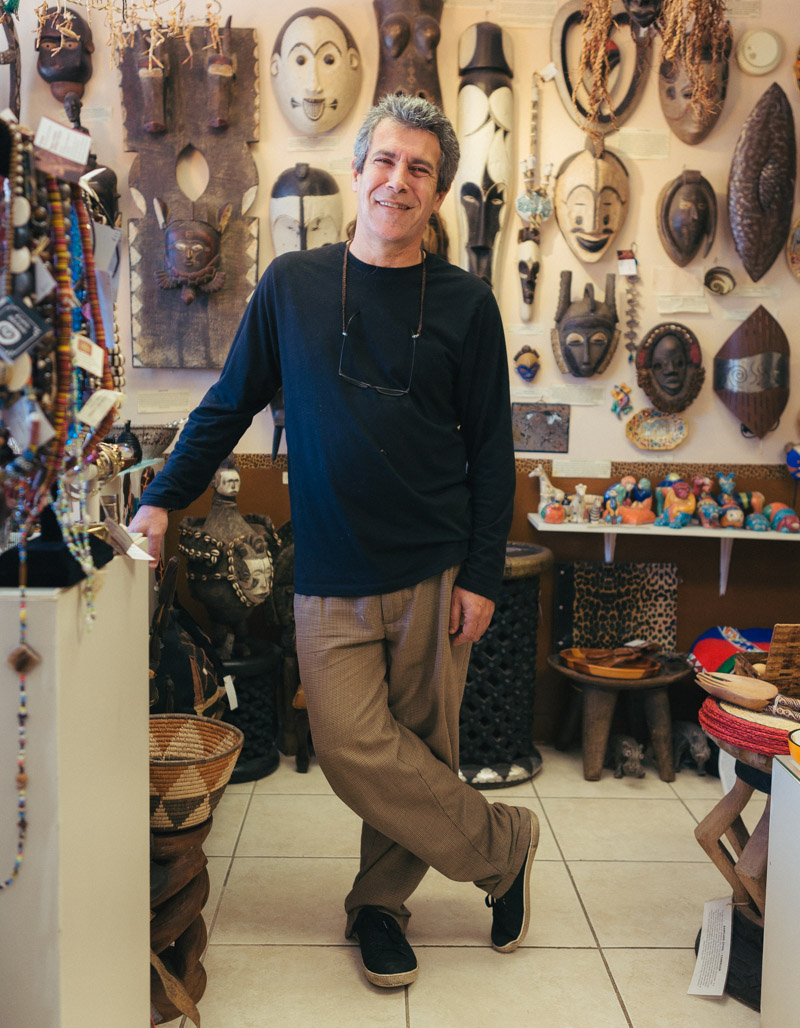Oversized crates tightly packed with intricately beaded zebra figurines, hand-carved wooden giraffes and brightly glazed elephants arrive at Nontando following store owner Gary Stern’s recent return from his annual three-week buying trip to South Africa. More than a means to replenish his stock, the nearly 8,000-mile journey back to his homeland is a pilgrimage of sorts. Driven by a desire to empower local artists, Stern scours the continent looking for both treasure and talent, teaching the fundamentals of entrepreneurism to those confronted by adversity.

PHOTOGRAPHY BY SENIOR PHOTOGRAPHER EVAN SIGMUND
“It’s almost impossible for a little guy to reach out to me. I physically have to go there to find him.” After 12 years of trial and error, navigating back roads and dealing with backwards suppliers, Stern knows where to source for quality. Away from bustling markets and overcrowded tourist haunts, he makes his way to a makeshift garage in Cape Town where artists carve, polish and market their works to suppliers.
Women in multicolored, batik skirts and men in faded Quicksilver T-shirts sit packed between high stacks of cardboard boxes and rows of wooden bowls. Deals are cut with handshakes as gangly giraffe figurines lean against dilapidated cement walls before being hauled off by suppliers. While many artists sell product to dealers in hidden backstreet storage rooms, others sell directly to buyers at markets, hauling weighted suitcases for miles to access tourist locales.
“It’s a hard life for people selling at markets,” says Stern, walking toward his store’s collection of serpentine, springstone and verdite stone carvings. Made by a husband and wife from Zimbabwe, the elaborate works emerge from large, raw stones transported in suitcases by train to South Africa where the chance of sales increases with higher tourist traffic. Carrying eight crates and four stones cradled in newspaper, they walk 45 minutes uphill to the market where they sculpt in hopes of making a sale. “The day I was there, they made 50 rand—less than five dollars,” says Stern. When it rains, they pack the stone carvings back into newspaper and crates, hide them somewhere clever, waiting for the rain to stop before unpacking again. “That’s how they live all year round,” says Stern.
Selling street-side where steady heat beats strongly and dirt clings to sweaty hands, an artist is lucky to make two sales in one day. Bernard, a young wire and bead sculptor from Zimbabwe was selling on the road’s edge two years ago when his beaded fish eagle wire sculpture caught Stern’s attention. Never touching a laptop in his life, Bernard had no means of communication for business. Stern brought him to an Internet café, set up a Yahoo account and now the two are in frequent communication about sales in Sarasota.
“I try to teach the artists that if they find five of me who will buy bulk from them, they don’t have to depend on the little guy perusing past their pieces.” Focusing on day-to-day survival, long-term entrepreneurial thinking isn’t common practice. Stern helps them see the direct correlation between networking and the success of their business. Leading by example, he makes an effort to foster both business and personal relationships on trips.
After a long day of negotiating in one of Cape Town’s back-alley warehouses, Stern invites new friends to dine with him. The smell of Cobra Wax Polish mingles with the aroma of peppery, curried stew as the Cameroonian village mother heats her hotplate in the next door shebeen. “I try to treat them to a nice meal,” says Stern, “but they prefer taking me to neighborhood hole-in-the-wall places with comfort food.” Growing up during South Africa’s apartheid, Stern’s exposure to the country’s rich cultural diversity was limited. “This business has given me the opportunity to interact with folk in other parts of Africa, which I never had the opportunity to do growing up, and that’s been fantastic. Africa to me is a lot more cultural now,” says Stern.
While the media exposes Africa’s dire poverty, HIV-AIDS epidemic and the widespread government corruption, it often neglects the rapidly burgeoning middle class. “There’s a huge middle ground that doesn’t get exposure,” says Stern. “I’m buying from people like you and me, normal people trying to buy a car and house or put kids through school.” From a distance, the vivid colors get muddled and dimmed but Stern focuses on bringing back pieces that reflect Africa’s broad spectrum of diversity. The culmination of Stern’s hard work through personal sourcing makes Nontando a kaleidoscope of color filled with art intended to enlighten local perspectives.








